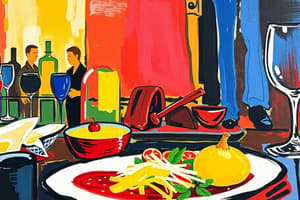Podcast
Questions and Answers
Quel mouvement culinaire met l'accent sur des plats plus légers et des ingrédients frais ?
Quel mouvement culinaire met l'accent sur des plats plus légers et des ingrédients frais ?
- Cuisine classique
- Cuisine fusion
- Nouvelle Cuisine (correct)
- Cuisine médiévale
Quel période a vu la cour royale française devenir un centre de développement culinaire ?
Quel période a vu la cour royale française devenir un centre de développement culinaire ?
- Renaissance
- 17ème et 18ème siècles (correct)
- Moyen Âge
- 19ème siècle
Quels éléments sont caractéristiques des desserts français ?
Quels éléments sont caractéristiques des desserts français ?
- Ingrédients précis et préparation complexe (correct)
- Préparations à base de viande
- Utilisation de fruits uniquement
- Ingrédients indéfinis et préparation simple
Quel aspect contemporain de la cuisine française est de plus en plus mis en avant par les chefs ?
Quel aspect contemporain de la cuisine française est de plus en plus mis en avant par les chefs ?
Quel élément n'est pas associé à l'évolution de la cuisine française moderne ?
Quel élément n'est pas associé à l'évolution de la cuisine française moderne ?
Quel est un aspect essentiel des ingrédients utilisés dans la cuisine française?
Quel est un aspect essentiel des ingrédients utilisés dans la cuisine française?
Quelle technique de cuisson consiste à cuire lentement des viandes ou des légumes dans un liquide?
Quelle technique de cuisson consiste à cuire lentement des viandes ou des légumes dans un liquide?
Parmi les régions suivantes, laquelle est reconnue pour ses influences allemandes?
Parmi les régions suivantes, laquelle est reconnue pour ses influences allemandes?
Quel chef est connu pour avoir modernisé et codifié les techniques de cuisine française?
Quel chef est connu pour avoir modernisé et codifié les techniques de cuisine française?
Quel est l'élément de cuisson principalement utilisé en Bretagne?
Quel est l'élément de cuisson principalement utilisé en Bretagne?
Quel type de plats sont typiques des bouchons à Lyon?
Quel type de plats sont typiques des bouchons à Lyon?
Quel type de cuisine est souvent considéré comme la pierre angulaire de la cuisine française moderne?
Quel type de cuisine est souvent considéré comme la pierre angulaire de la cuisine française moderne?
Quelle combinaison de saveurs est souvent mise en avant dans la cuisine française?
Quelle combinaison de saveurs est souvent mise en avant dans la cuisine française?
Flashcards
L'influence de l'ère romaine
L'influence de l'ère romaine
L'influence romaine sur la cuisine française a apporté des techniques de conservation des aliments et l'utilisation d'épices.
La Nouvelle Cuisine
La Nouvelle Cuisine
La cuisine française moderne met l'accent sur les plats plus légers et les ingrédients frais.
Spécialités régionales
Spécialités régionales
Les chefs contemporains s'efforcent de mettre en valeur l'authenticité et les saveurs régionales.
Produits bio et biodynamiques
Produits bio et biodynamiques
Signup and view all the flashcards
Desserts français
Desserts français
Signup and view all the flashcards
Cuisine française
Cuisine française
Signup and view all the flashcards
Ingrédients frais
Ingrédients frais
Signup and view all the flashcards
Techniques précises
Techniques précises
Signup and view all the flashcards
Équilibre des saveurs
Équilibre des saveurs
Signup and view all the flashcards
Présentation
Présentation
Signup and view all the flashcards
Variations régionales
Variations régionales
Signup and view all the flashcards
Auguste Escoffier
Auguste Escoffier
Signup and view all the flashcards
Paul Bocuse
Paul Bocuse
Signup and view all the flashcards
Study Notes
Introduction
- French cuisine is renowned worldwide for its sophistication, flavor, and diversity.
- It encompasses a wide array of regional specialties, reflecting the country's diverse geography and history.
- Key influences include Roman, medieval, and Renaissance traditions, alongside later developments linked to the rise of the middle class and the French royal court.
- Modern French cuisine is often considered a cornerstone of haute cuisine.
Key Components of French Cooking
- Fresh, high-quality ingredients: A significant emphasis on fresh, seasonal produce and locally sourced ingredients.
- Precise techniques: French cooking relies on precise techniques like sautéing, braising, and roasting, developed over centuries.
- Balance and harmony of flavors: Meals are often structured to feature a balance of flavors, incorporating sweet, sour, salty, and bitter elements, sometimes in a layered approach.
- Presentation: An appreciation for beautifully presented dishes is integral.
Regional Variations
- Alsace: Known for its German influences, featuring dishes like choucroute garnie and flammekueche.
- Brittany: Seafood is prominent, with butter a key ingredient in some culinary traditions. Galettes and crêpes are emblematic dishes.
- Burgundy: Red Burgundy wine and rich sauces, derived from game meats and hearty stews, are characteristic.
- Provence: Robust flavors, herbs (like rosemary and thyme), tomatoes, and olive oil are key elements in dishes like bouillabaisse and tapenade.
- Normandy: Seafood, especially Normandy oysters, is central. Beef and pork are also important components.
- Lyon: Known for its bouchons (traditional restaurants) serving hearty, rustic dishes like quenelles and sauces.
Fundamental Techniques
- Sautéing: Cooking ingredients rapidly in a hot pan with a minimal amount of fat.
- Braising: Cooking meats or vegetables slowly in liquid, resulting in tender texture and deep flavors.
- Roasting: Cooking with dry heat, often used for meats and vegetables.
- Poaching: Cooking food gently in simmering liquid, resulting in a delicate flavor and texture.
Major Culinary Figures and Schools
- Auguste Escoffier: A major influence in modernizing and codifying French cooking techniques.
- Gaston Lenôtre: A highly influential figure in pâtisseries and desserts.
- Paul Bocuse: A multi-talented chef, Bocuse is known for his innovations and contributions to French cooking.
Influences on French Cuisine
- Roman era: Introduced techniques for preserving food and using spices.
- Medieval period: Developed simple dishes and preserved culinary knowledge through monasteries.
- Renaissance: Increased use of spices and more elaborate dishes emerged.
- 17th and 18th centuries: The French royal court became a hub for culinary development.
- 19th and 20th centuries: Refinement, codifying, and innovation shaped modern French cuisine.
Modern French Cuisine and Trends
- Nouvelle Cuisine: A movement emphasizing lighter dishes and fresh ingredients.
- Biodynamic and organic produce: Increased focus in contemporary culinary practice.
- Regional specialties: Contemporary chefs increasingly emphasize authenticity and regional flavors.
- Fusion cuisine: New dishes incorporate international influences while maintaining the high standards of French cooking.
Desserts (Quelques points importants)
- Many French desserts are notable for their precise ingredients and intricate preparation, e.g., macarons.
- Custards, crème brûlée, tarts, and pastries all feature prominently.
Conclusion
- French cuisine continues to evolve while retaining its core values.
- Innovation coexists with the respect for tradition, creating a globally significant and recognized culinary heritage.
Studying That Suits You
Use AI to generate personalized quizzes and flashcards to suit your learning preferences.
Description
Ce quiz explore les composants clés de la cuisine française, y compris l'importance des ingrédients frais et de qualité. Il met en lumière les techniques précises et l'harmonie des saveurs qui définissent cette cuisine renommée. Découvrez comment l'histoire et la culture ont influencé les traditions culinaires françaises modernes.



